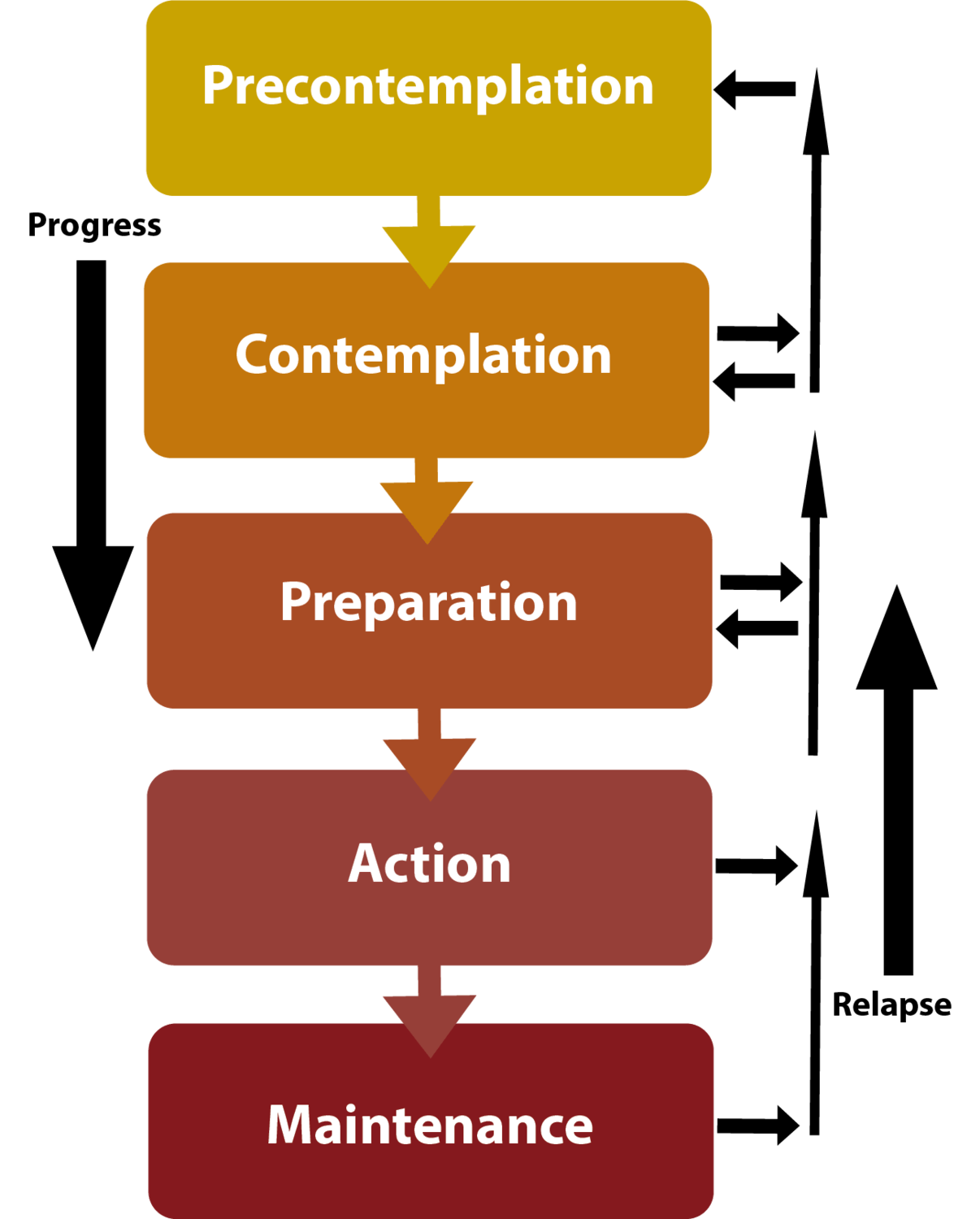Stages of Change
We often think that changing behavior is a simple “yes-no” decision. However the reality is more complicated than that. Watch the short video and review the teaching below to learn how this understanding can affect our personal behavior change as well as influence how we can best support others.
Pre-Contemplation
Characteristics of this Stage:

- No consideration to change.
- Lack of motivation to change.
- Low self-efficacy (i.e., the person may not believe that they can actually change).
- Lack of information.
- Contentment with the “status quo.”
Helpers can…
- Establish rapport and build trust.
- Offer factual information about the problem.
- Explore pros/cons of continuing on the road they are on.
- Discuss the effect of the negative consequences they are experiencing.
- Express concern and keep the door open.
Contemplation
Characteristics of this Stage:
- Active consideration to change.
- Ambivalence.
- Self re-evaluation.
- External motivation.
- Person starts considering the pros/cons or risks/benefits of changing.
Helpers can…
- Encourage the person that feeling ambivalent is normal.
- Emphasize the person’s free choice, responsibility, and ability to change.
- Help the person to see change as having internal as well as external benefits.
- Help the person “tip the scale” toward change by helping the client focus on his/her own true values and goals.
Preparation
Characteristics of this Stage:
- There is a commitment to act.
- The person is seeking a window of opportunity to do it and how.
- Cognitive reframing.
- Internal motivation.
- Person is willing to take a risk and try something.
Helpers can…
- Help the person clarify their own goals and strategies for change.
- Offer a menu of options of ways to begin.
- Help person enlist social support.
- Consider the barriers to change and help the person lower them (finances, childcare, transportation, work, etc.).
- Discuss a change plan.
Action
Characteristics of this Stage:
- Active change is occurring, but the person hasn’t reached a stable state yet.
- Behavior is goal directed.
- Active response to challenges.
- Willingness to experiment and learn new skills.
Helpers can…
- Assist the person by focusing on reinforcing positive change.
- Support a realistic view of change through small steps.
- Acknowledge the difficulties of beginning a change.
- Help person identify high-risk situations and plan for them.
- Assist the person in finding coping strategies.
Maintenance
Characteristics of this Stage:
- The person is working to prevent relapse.
- As time goes on, person becomes less tempted.
- Re-evaluation.
- Setting long-term goals.
- Continued development of new skills.
- Open to feedback.
Helpers can…
- Help the person identify new and healthy sources of pleasure (i.e., “don’t take something away without adding something”)
- Help the person practice new coping strategies.
- Develop a “fire escape” plan in event of relapse.
- Maintain supportive contact.
- The person needs to think about how s/he becomes part of the solution.
So, what does this mean for helpers?
- Change is not a simple yes or no decision.
- The people you are trying to help are at various points (stages) along a continuum of readiness
to change. - Typically, an individual doesn’t skip stages; although the time spent in each stage by different people can vary widely.
- Ways to help an individual are different depending on what stage he or she is in.
- If someone is in Pre-Contemplation, it does no good to ask them to start an Action program tomorrow.
Further Information
Stages of Change Webinar
In this webinar, the 5 stages of change are identified and realizing each stage solicits a different response from us as a helper is a critical part of helping others. [ACCFS]
Supporting Others in Change
Life is filled with change. As we have the privilege of sharing in change with others, we would do well to remember individuals all have different responses and emotions that come with change. Change provides the opportunity for growth and fruit and allows for us to point others towards the confidence of God’s work in them, ultimately pointing them towards our unchanging God himself– who is “the same yesterday, and today, and for ever” (Hebrews 13:8). [ACCFS]





Comments
Leave a Comment